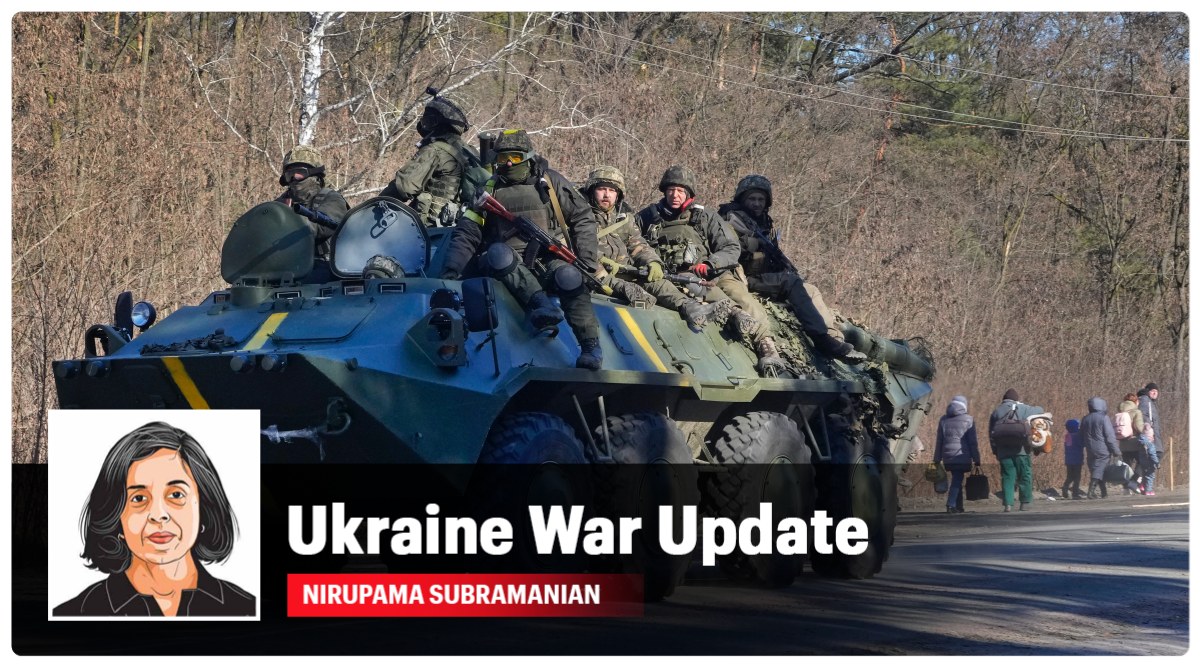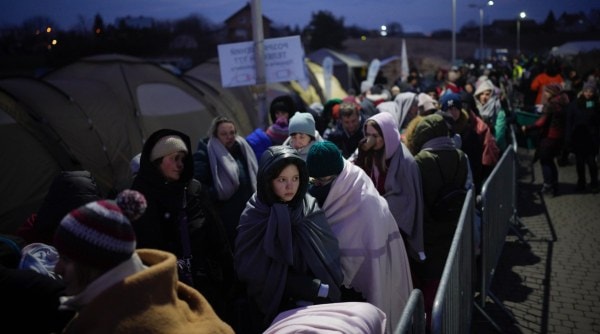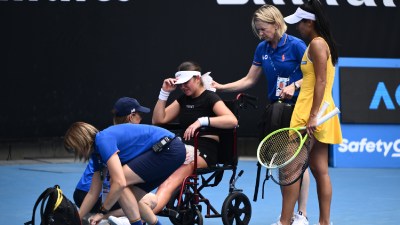Ukraine war update, March 11: The view from the South Asian region
The vote against Russia by South Asia's smaller countries, reflect a different preoccupation, relating to their geographical and economic size and their proximity to powerful neighbours.
 Ukrainian soldiers on an armored personnel carrier pass by people carrying their belongings as they flee the conflict, in the Vyshgorod region close to Kyiv, Ukraine, Thursday, March 10, 2022. (AP Photo/Efrem Lukatsky)
Ukrainian soldiers on an armored personnel carrier pass by people carrying their belongings as they flee the conflict, in the Vyshgorod region close to Kyiv, Ukraine, Thursday, March 10, 2022. (AP Photo/Efrem Lukatsky)
Today, March 11, is Day 16 of Russia’s invasion of Ukraine. Here’s what you need to know about the war today.
The high-level talks between Russian foreign minister Sergey Lavrov and his Ukrainian counterpart Dymtro Kuleba failed to make a breakthrough.
Lavrov made remarks to the effect that the lower-level talks, between officials of the two sides — three rounds have been held so far — were more important, and would be more useful, though so far they have focussed only on the temporary “regime of silence” or ceasefire, to enable evacuation of civilians.
On the ground, the long-expected assault on Kyiv remains frozen.
The Institute for the Study of War, a US think tank that puts out daily military analysis of the invasion, believes that the Russian military is bogged down, and unable to make an advance into Kyiv.
“There are as yet no indications that the Russian military is reorganizing, reforming, learning lessons, or taking other measures that would lead to a sudden change in the pace or success of its operations, although the numerical disparities between Russia and Ukraine leave open the possibility that Moscow will be able to restore rapid mobility or effective urban warfare to the battlefield,” it said in its latest analysis.
Meanwhile civilians continue to die, even though we still don’t have specific numbers.
The UN Office of the High Commissioner for Human Rights said up to March 9, a total of 549 people have been killed (101 men, 67 women, 6 girls, and 9 boys, as well as 26 children and 340 adults whose sex is yet unknown).
A total of 957 have been injured (81 men, 64 women, 14 girls, and 4 boys, as well as 34 children and 760 adults whose sex is yet unknown). OHCHR said it believes the casualties could be much higher.
The Ukraine government said three people, including a six-year-old child were killed in the Russian airstrike of a hospital in the southern city of Mariupol.
🗞️ Subscribe Now: Get Express Premium to access the best Election reporting and analysis 🗞️
The UN agency has given a geographical break up of the casualties as follows:
* In Donetsk and Luhansk regions: 608 casualties (123 killed and 485 injured);
* In other regions of Ukraine (the city of Kyiv, and Cherkasy, Chernihiv, Kharkiv, Kherson, Kyiv, Mykolaiv, Odessa, Sumy, Zaporizhzhia, and Zhytomyr regions), which were under government control when casualties occurred: 898 casualties (426 killed and 472 injured)
* Most of the civilian casualties recorded were caused by the use of explosive weapons with a wide impact area, including shelling from heavy artillery and multi-launch rocket systems, and missile and air strikes.
I will be back Monday with the next edition of the Ukraine Newsletter.
 A woman from Ukraine stands at the border with her fiance from the United States as she waits to ask for asylum, Thursday, March 10, 2022, in Tijuana, Mexico. (AP Photo/Gregory Bull)
A woman from Ukraine stands at the border with her fiance from the United States as she waits to ask for asylum, Thursday, March 10, 2022, in Tijuana, Mexico. (AP Photo/Gregory Bull)
Meanwhile, here’s something to chew on – how this faraway war has impacted other countries in South Asia and influenced their positions on it.
Just as India’s tightrope over Russia’s invasion of Ukraine was the result of its partnerships on both sides of the conflict, the stand taken by other countries in South Asia similarly reflect their own predilections — a combination of geopolitics, economics and domestic compulsions.
Afghanistan, Bhutan, Maldives, and Nepal supported the resolution against Russia in the United Nations General Assembly, along with 141 other nations. India abstained, as did Bangladesh, Pakistan and Sri Lanka. Additionally, Nepal, which is a member of the United Nations Human Rights Council, voted for the resolution to set up an independent investigation into Russia’s alleged violations of human rights as a fallout of the Ukraine invasion.
Put another way, other than India, the three big countries (Bangladesh, Pakistan and Sri Lanka) took a neutral stand, and the four smaller countries voted against Russia.
For Sri Lanka, the conflict worsens its economic gloom.
Colombo had been hoping that its meltdown could be arrested by a recovery on tourism, its mainstay industry. But what it might gain from tourism has been offset by the oil shock. Oil prices continue to remain unpredictable, surging to nearly $130 a barrel earlier in the week, then dropping on Wednesday, but still remaining well over $100.
An acute shortage of foreign exchange has crippled its ability to buy oil among other essentials for the import dependent economy. That has had its own cascading effect, with its oil-fired power plants unable to produce enough electricity, leading to massive island wide power cuts.
 A Sri Lankan bus worker and auto rickshaw drivers wait to buy fuel at a fuel pump in Colombo, Sri Lanka, Wednesday, March 2, 2022. (AP Photo/Eranga Jayawardena)
A Sri Lankan bus worker and auto rickshaw drivers wait to buy fuel at a fuel pump in Colombo, Sri Lanka, Wednesday, March 2, 2022. (AP Photo/Eranga Jayawardena)
Meanwhile, prices of essentials have jumped due to petrol and diesel shortages. India’s $500 million credit line has proved inadequate, and all indications are that the country, despite political reluctance, may have no option but to knock on the doors of the IMF imminently.
Even in the tourism sector, which had shown signs of recovering from the double whammy of the 2019 Easter suicide bombings and the Covid-19 pandemic, Sri Lanka might take a hit — Russia and Ukraine were a major market.
Nearly 23,000 Russian tourists had arrived at Colombo International Airport in February. That number is bound to drop like a stone due to the sanctions and air space closure. Russia is also a major buyer of Sri Lankan tea, the country’s biggest export. Colombo is wondering how it will do business with Russian buyers.
While its economic relations with Russia were one reason for Sri Lanka’s abstention, some in Colombo questioned this, and drew comparisons with the 1971 India-Pakistan war that led to the liberation of Bangladesh, when Sri Lanka sided with Pakistan and gave it refuelling facilities.
“What was the principle behind Mrs [Sirimavo] Bandaranaike’s position? It was the absolute value placed on the territorial integrity and political independence of Member States by the UN Charter…. India had no right to violate the territorial integrity of Pakistan. Strong self-interest lay behind the position. The existential threat to Sri Lanka was seen as coming from India. No precedent could be created that could support India’s support for Sri Lanka’s minorities and infringement of Sri Lanka’s territorial integrity,” Rohan Samarajiva has argued.
Pakistan’s decision to abstain at the UNGA vote was a reflection of its ties with Russia built over the last decade as a response to its tensions with its relations with the US during the long Afghan war.
US-Pakistan relations have cooled further during the Biden presidency, and the withdrawal from Afghanistan. The US President and Pakistani Prime Minister Imran Khan have not spoken even once. Pakistan is attempting to find solace in the arms of China, and Russia, with some in its strategic community envisioning a three-way axis that will take charge over Afghanistan, Central Asia and Eurasia.
But the Pakistani leader’s awkwardly timed visit to Moscow — he became the first foreign leader to meet Russian President Vladimir Putin after the invasion of Ukraine — has left the world baffled, with many Pakistani commentators calling it “ill advised”. Journalist Hamid Mir questioned not just the timing, but also Khan’s romance with Russia given his record of anti-Russia stands over the last 25 years.
Bangladesh also abstained. Foreign Minister A K Abdul Momen said Dhaka’s position was for “peace and stability throughout the world”.
“We have spoken about the need for a peaceful resolution through talks. We have said the same thing at the UN. We have said that we are deeply concerned. The secretary general of the United Nations should take an initiative to bring about a peaceful solution,” Momen said in Dhaka after the vote.
Bangladesh’s abstention can also be seen in the light of cool relations between the US and the Sheikh Hasina government, and the Biden Administration’s December 2021 decision to sanction the Rapid Action Battalion, an elite paramilitary deployed against jihadist groups, for its alleged human rights violations.
On the other hand, Dhaka remembers with gratitude that Moscow helped India militarily during the 1971 war that led to the country’s liberation from Pakistan, while the US sided with Pakistan. Russia is now constructing Dhaka’s first nuclear power plant at Rooppur. This makes the case [ https://www.orfonline.org/expert-speak/assessing-south-asias-responses-to-the-ukraine-crisis/ ] that Russia is a significant development partner of Bangladesh, and has helped it sustain its economic growth and energy security. The Sheikh Hasina government is also close to New Delhi, and India’s stand may have also influenced Dhaka’s choice.
The vote against Russia by South Asia’s smaller countries, reflect a different preoccupation, relating to their geographical and economic size and their proximity to powerful neighbours.
NEPAL made the strongest pitch against Russia. Given that it is sandwiched between China and India, both of which abstained in the UN vote, and with a domestic debate raging on whether to accept development funds from the US, its unequivocal vote for the resolution was somewhat counter-intuitive.
Nepal’s vote can also be seen in the light of its recent difficulties with Delhi’s new map of India to which Kathmandu had taken objection, claiming that it includes Nepal territory.
Amrit Rai, Nepal’s Permanent Representative to the United Nations, said in the UN General Assembly that his country opposed any threat or use of force against the territorial integrity and political independence of any sovereign country.
The Kathmandu Post was more explicit in an editorial that questioned New Delhi’s neutrality. “Sharing borders with a multitude of South Asian and Southeast Asian nations, India is at a confluence, even clash, of civilisations. Its own relationship with two of its neighbours, China and Pakistan, remains pretty strained. For a country that seeks the help of other nations when it is itself in crisis, it is disappointing that it cannot make an independent stand when a powerful nation is bullying a weaker one,” the newspaper said even as it thanked India for evacuating Nepali nationals along with its own from the war zone.
Ahead of the UN voting, US Secretary of State Anthony Blinken on Tuesday night called Prime Minister Sher Bahadur Deuba and discussed the Ukraine crisis among other things.
 Refugees fleeing war in neighbouring Ukraine queue at the Medyka border crossing, Poland, Thursday, March 10, 2022. (AP Photo/Daniel Cole)
Refugees fleeing war in neighbouring Ukraine queue at the Medyka border crossing, Poland, Thursday, March 10, 2022. (AP Photo/Daniel Cole)
BHUTAN, usually viewed as a camp follower of India, but which, in fact, has been asserting an independent foreign policy for a few years now, also voted against Russia.
Check out the thread below by a prominent Bhutanese journalist for a view of the conflict from Thimphu.
Thread
𝐄𝐢𝐠𝐡𝐭 𝐥𝐞𝐬𝐬𝐨𝐧𝐬 𝐟𝐫𝐨𝐦 𝐭𝐡𝐞 𝐑𝐮𝐬𝐬𝐢𝐚𝐧 𝐢𝐧𝐯𝐚𝐬𝐢𝐨𝐧 𝐨𝐟 𝐔𝐤𝐫𝐚𝐢𝐧𝐞
1. The first & most important lesson is not to launch an invasion of another sovereign country in this day & age. This should be clear by now from the tremendous economic pain
— Tenzing Lamsang (@TenzingLamsang) March 3, 2022
Sandwiched like Nepal between two regional giants, Bhutan’s main concern has been to avoid getting caught in their rivalry. China claims on Bhutan territory led to the two sides signing an MoU last October for a three step border agreement, that is being seen as a dressing up of Chinese fait accompli on the ground.
MALDIVES, which signed a defence agreement with the US last year, and under the Solih government, has shed the previous Yameen government’s China tilt in foreign policy, also voted against Russia. Its foreign minister Abdullah Shahid is the president of the UN General Assembly.
“In today’s interconnected and interdependent world, nations are drawn into conflicts regardless of how far away they may be. And even if they do not wish to be part of those conflicts, sometimes by default, and sometimes by design.The Russia, Ukraine conflict has the possibility of becoming a much wider conflict with grave consequences. We are reminded of the need for closer cooperation among regional partners to avoid conflict and ensure security and stability both inside and outside our borders,” Maldives Defence Minister Maria Didi said at the Colombo Security Conclave in Male earlier this week.
Newsletter | Click to get the day’s best explainers in your inbox
AFGHANISTAN, which continues to be represented at the UN by its ousted government, voted against Russia. The Taliban regime, which is yet to be recognised as the legitimate government of Afghanistan, issued a statement declaring neutrality in the Ukraine conflict. Among the people of Afghanistan, there is concern that Russia’s invasion of Ukraine has deflected the world’s attention from the humanitarian catastrophe in their own country.
- 01
- 02
- 03
- 04
- 05







































